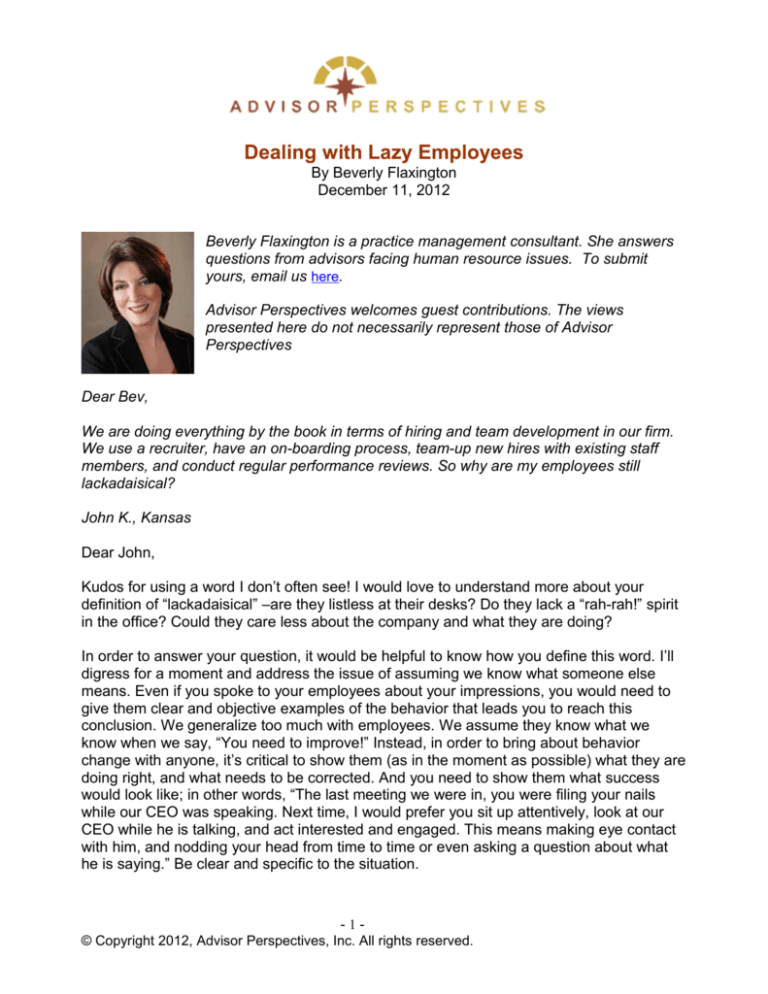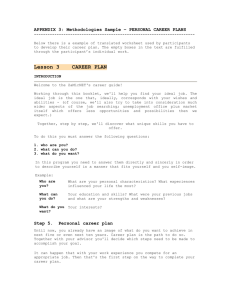
Dealing with Lazy Employees
By Beverly Flaxington
December 11, 2012
Beverly Flaxington is a practice management consultant. She answers
questions from advisors facing human resource issues. To submit
yours, email us here.
Advisor Perspectives welcomes guest contributions. The views
presented here do not necessarily represent those of Advisor
Perspectives
Dear Bev,
We are doing everything by the book in terms of hiring and team development in our firm.
We use a recruiter, have an on-boarding process, team-up new hires with existing staff
members, and conduct regular performance reviews. So why are my employees still
lackadaisical?
John K., Kansas
Dear John,
Kudos for using a word I don’t often see! I would love to understand more about your
definition of “lackadaisical” –are they listless at their desks? Do they lack a “rah-rah!” spirit
in the office? Could they care less about the company and what they are doing?
In order to answer your question, it would be helpful to know how you define this word. I’ll
digress for a moment and address the issue of assuming we know what someone else
means. Even if you spoke to your employees about your impressions, you would need to
give them clear and objective examples of the behavior that leads you to reach this
conclusion. We generalize too much with employees. We assume they know what we
know when we say, “You need to improve!” Instead, in order to bring about behavior
change with anyone, it’s critical to show them (as in the moment as possible) what they are
doing right, and what needs to be corrected. And you need to show them what success
would look like; in other words, “The last meeting we were in, you were filing your nails
while our CEO was speaking. Next time, I would prefer you sit up attentively, look at our
CEO while he is talking, and act interested and engaged. This means making eye contact
with him, and nodding your head from time to time or even asking a question about what
he is saying.” Be clear and specific to the situation.
-1© Copyright 2012, Advisor Perspectives, Inc. All rights reserved.
Regarding your overall question, many times employees don’t show motivation for one of
two reasons – either it isn’t in their behavioral style to get excited and be enthusiastic and
upbeat, so they are more low-key and non-emotional in approach and appearance, or they
aren’t engaged because the firm hasn’t clearly defined a vision and mission and
communicated it to them so they feel a part of something. There are other extenuating
factors, of course, but these are the two I observe most frequently. I will leave it to you to
determine which one, or both, might fit your company and circumstances.
Dear Bev,
I have an embarrassing question to ask that I don’t see often written about. We have an
employee in our advisory firm who smells. it appears that this person does not shower and
does not use deodorant. In meetings, most of the staff cannot tolerate sitting near the
person. People come to me to complain and refuse to work alongside this colleague. I am
not a people-person and not a psychologist. I don’t know how to have a conversation
about this topic. And to top it off, this is one of my key people. Without this resource our
firm would be lost, I am fearful of a negative outcome
Anonymous
Dear Advisor,
This is a difficult issue, and I have had people raise this in different ways. Sometimes the
person is dressing inappropriately or using foul language. But this is one of the stickier
ones I’ve seen. There is a real impact on others as a result of this person’s situation, but
the person is likely somewhat unaware of the impact!
You have to address this situation. The longer it goes on, the more irate the rest of your
staff is going to be and the longer others will build resentment toward this person. Here are
few suggestions to that are useful for any advisor when dealing with an uncomfortable
employee situation:
1. Don’t call the person into your office as if they are being disciplined. If this person
has an office, go to see them and clos the door. If they don’t have an office, ask
them to step out for coffee or tea for a few minutes. Try to minimize the formal impact of the discussion first so it doesn’t come across as if they are in trouble for
something.
2. Tell the person it is a difficult issue for you: “There is something I need to talk about
with you that is making me uncomfortable. I respect you and your contribution to the
firm and want to be honest with you, but I struggle to find the right words.” Don’t be-2© Copyright 2012, Advisor Perspectives, Inc. All rights reserved.
labor this, because the person will start wondering what’s up, but start off this way
so you can be honest about your own discomfort.
3. Keep it factual; don’t try to psychoanalyze the person. Be clear and to the point, but
then bring it around to how addressing this is good for the employee. Don’t talk
about how upset everyone else is; talk about how this is compromising this person.
“You may not be aware of this, but whatever you are doing with your personal care
is not working very well. Often there is a body odor around you. Honestly, it isn’t
anyone’s business how you take care of yourself but it is becoming difficult for others to be near you and I am worried this will inhibit your ability to continue to be successful.” You could also take the approach that it may be a medical issue the employee isn’t aware of – “Perhaps it makes sense to speak to your doctor about this?
Let us know if there is anything we can do through our medical program here to
provide support” (if this applies in your firm and you can do this). Then stop. Don’t
keep talking. When most people are addressing something uncomfortable they
keep going, or go down different tracks, or try to relate a personal situation. Don’t do
it. Bite your tongue. You have said your piece, now it is up to the person to respond
and decide if they can deal with it or not.
Best of luck. This is a very uncomfortable situation. Acknowledge that yourself, but then
realize you do need to deal with it. Being direct, to-the-point, objective and non-accusatory
is always the best way!
Beverly Flaxington co-founded The Collaborative, a consulting firm devoted to business
building for the financial services industry in 1995; in 2008 she co-founded Advisors
Trusted Advisor to offer dedicated practice management resources to advisors, planners
and wealth managers. She is currently an adjunct professor at Suffolk University teaching
undergraduate students Leadership & Social Responsibility. Beverly is a Certified
Professional Behavioral Analyst (CPBA) and Certified Professional Values Analyst
(CPVA).
She has spent over 25 years in the investment industry and has been featured in Selling
Power Magazine and quoted in hundreds of media outlets, including the Wall Street
Journal, MSNBC.com, Investment News and Solutions Magazine for the FPA. She speaks
frequently at investment industry conferences and is a speaker for the CFA Institute.
www.advisorperspectives.com
For a free subscription to the Advisor Perspectives newsletter, visit:
http://www.advisorperspectives.com/subscribers/subscribe.php
-3© Copyright 2012, Advisor Perspectives, Inc. All rights reserved.








